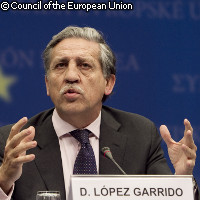Competitiveness Council focus on 2020 Strategy
An exchange of views was held on the new 2020 Strategy for jobs and growth at the latest meeting of the Competitiveness Council on 1 and 2 March in Brussels, Belgium. The debate focused on the new strategy from the perspective of the internal market and will help contribute to the general framework of the new strategy. 'The EU must enhance and strengthen its single market, which is one of the most important elements that can contribute to sustainable growth and the creation of quality employment, a single open, transparent, non-protectionist internal market,' said Diego López Garrido, Spanish Secretary of State for the European Union and one of the three joint chairs of the meeting. Ministers discussed the best ways to begin designing the 2020 Strategy, how to secure political commitments towards the strategy from all Member States and how to set up clear, ambitious and realistic targets for jobs and growth and to foster competitiveness throughout the EU. The 2020 Strategy will build on the successes of the Lisbon Strategy, the EU's development action plan created to stimulate growth and create more and better jobs, which ran from 2000 to 2010. The 2020 Strategy is expected to help kick-start recovery from the current economic downturn and create an ambitious new structural reform agenda at both national and EU levels. The 2020 Strategy will continue with the Lisbon Strategy's process of creating growth in the context of sustainable development, making greater public investment in infrastructure, putting research and technology high on the economic agenda and investing in a greener economy. Competitiveness Council members agreed on many areas regarding the new strategy, including the importance of deepening the internal market and avoiding protectionism and of encouraging European industry towards a green and sustainable economy, as well as the necessity of putting research and innovation at the heart of the new strategy. They also agreed also that research must be focused on the most pressing current issues such as climate change, energy, food security, health and demographics. There was agreement that the European Research Area (ERA) must be extended as far as possible and that the tools to be used for this should include investments in research, development and innovation, and investments in physical infrastructures such as transport and energy networks and innovative technologies. Strengthening of the 'knowledge triangle' of education, research and innovation was also acknowledged to be of the utmost importance. There was broad agreement on the need for the European economy to strengthen its industrial, technological and energy hub and to improve the regulatory framework for small and medium-sized enterprises (SMEs) so as to better facilitate their access to research opportunities and financial schemes. The Council also adopted a resolution aimed at enhancing the enforcement of intellectual property rights (IPR) in an internal market. In addition, the ministers adopted conclusions on a European partnership for researchers. There was agreement on the importance of encouraging researcher mobility throughout the EU, including the provision of social security coordination issues and supplementary pensions. The conclusions will be discussed by employment and social policy ministers at their next meeting on 8 March. Finally, the ministers adopted conclusions on the structure and mechanisms of the European Research Council (ERC). Among other things, the ministers call on the Commission to carry out an independent evaluation in 2011 as a follow-up to the recommendations made in last year's review of the ERC. Other factors considered in the conclusions concern the evaluation process, the integration of scientific and administrative functions, and the simplification of procedures. If they prove successful at the ERC, simplified measures could be extended to the rest of the framework programme, the ministers note. The ministers conclude by inviting the Commission to 'support the ERC in its efforts to effectively promote the attractiveness of the ERC to retain as well as repatriate and recruit the world's most talented scientists and encourage the participation of scientists from the industrial or enterprise sector'.



